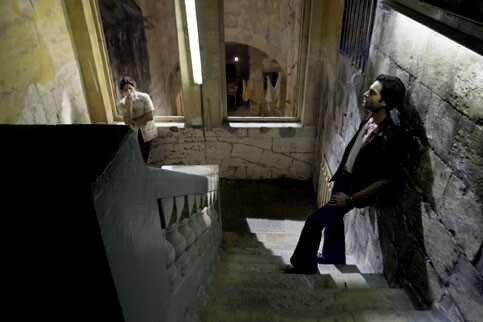Pittsburgh Post-Gazette 23 December 2005

Hunted PLO member Ali (Omar Metwally) explains what dispossession means to Avner (Eric Bana) (Image: Universal)
In a purely fictional scene from the mostly factual “Munich,” director Steven Spielberg places the leader of a Mossad assassination squad and a philosophical Palestinian terrorist together on a stairwell landing, casually smoking cigarettes and calmly, curiously, politely exchanging ideas.
Spielberg says the movie couldn’t work without that scene and suggests that in the real world an Israeli-Palestinian peace can’t work without more of that kind of tolerant give-and-take.
Decades of violence have polarized perceptions on both sides: Palestinian supporters may sense a Western-Israeli bias in this story’s description of a Palestinian “terrorist”; those who back the Israelis might bristle that a killer of Israel’s Olympic team is lauded as being “philosophical.”
That diametrical opposition of views showed itself in separate phone interviews with two writers who have reported on Munich’s impact on Israeli-Palestinian relations. Aaron J. Klein was a 12-year-old Israeli living in Jerusalem during the 20th Olympic Games in Munich. His new book, “Striking Back” (Random House), examines the 1972 killings and Israel’s attempts to kill those responsible. Ali Abunimah was born in the United States to Palestinian parents. Founder and contributor to the Web site Electronic Intifada, he spoke recently at Carnegie Mellon University as part of the Pittsburgh Palestine Film Series.
Did Munich signal a change in tactics for the Israelis or the Palestinians?
Klein: I think Munich is the start of the beginning of a revolution in dealing with Palestinian terror. For Israel, it put assassination as a major tool. There were a few incidents before; afterward it became a major tool, and they’re still using it today.
Abunimah: I don’t think so. This single event wasn’t a change in tactic, but it came at a point when the Palestinian movement was changing. Their trying to get change in the Arab states had failed, in the international community no one was paying attention, and Israel occupied Gaza and the West Bank, and they felt unable to work in Palestine. Some groups took up that tactic of carrying out spectacular acts in other countries.
How did the events of Munich affect international perception of the conflict?
Klein: The world didn’t want to get involved. It was a hot potato. After Munich, when the Israelis had to strike back, they had to work alone, they didn’t have the help of the U.S.A. or European countries. [Nations] were trying to have secret agreements so the Palestinians wouldn’t work on their soil.
Abunimah: At the time, there was broad acceptance in many places that people failing in all other options could resort to acts of political violence. The world perceived that people carrying out these acts could be doing so with valid political motives, even if they didn’t agree with their tactics.
Since Munich, what has the other side done right?
Klein: They’re trying to maintain some kind of establishment among them so it won’t deteriorate into chaos — not gangs in the streets of Palestinian cities, but a president who can work, a security apparatus that can work.
Abunimah: There are all kinds of things I admire about Israel. But those things are totally negated by what they’re doing wrong.
What has the world community done right and wrong?
Klein: There’s more awareness of terrorism as a problem in general, a problem that we have to deal with united, together. You can learn from an event like Munich. It didn’t help the European countries to [ignore] terrorism — it came to them anyway. What they’re doing wrong is not putting enough energy into [combating terrorism].
Abunimah: They’re acting as if there are two equals of equal strength who can voluntarily come to an agreement. That’s not going to happen. One side has overwhelming superiority militarily and economically, and the other side has very few cards in hand. I think the world is putting its finger on the Israeli side of the scale.
What would you like people from the other side to know about your people?
Klein: [Long pause.] That we don’t want to harm them for nothing, that we want peace. Most of the Palestinians don’t believe that because of their education. You should see the books they read in schools: Jews are evil and the enemy of the world. We look for peace like them, we’re looking for a normal life, we don’t want to conquer them.
Abunimah: Palestine is not going anywhere. We’re ready to live in peace with Israel on the basis of full equality — not second-class citizenship in the land of their birth. I am inspired by South Africa. Their conflict was three centuries old, but it came to a peace based on human rights, equal rights.
Related Links